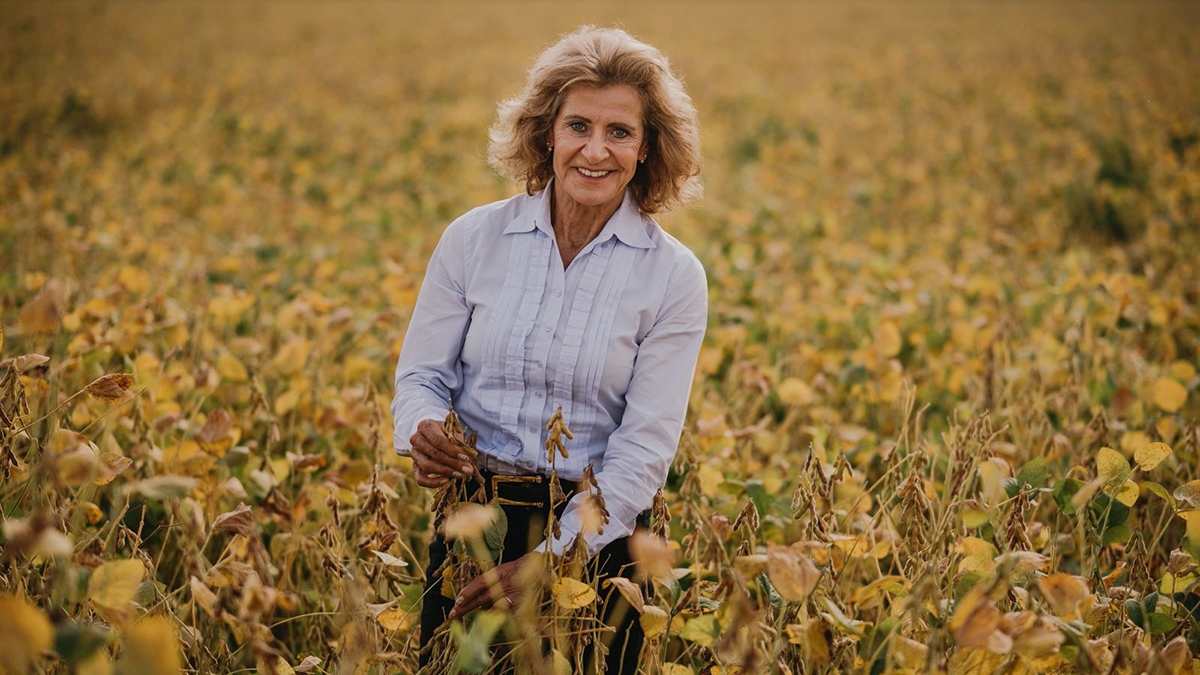Carminha Missio became a leader in grain production in Western Bahia. Photo: Calan Sanderson
No one achieves anything alone. Farmers need to stay together.
Carminha Missio
Carminha Missio is a leader in the Brazilian farming community. Her commitment to effective soil conservation has inspired other soy farmers in the vast Matopiba region of Brazil. Motivated to educate others on better farming practices, and wanting to create an awareness about the impact farming has on the natural environment, Carminha signed up to take part in Solidaridad’s carbon balance study in Western Bahia. As she says, “We need to promote good practices and show how they add value to production. The farmer’s mission is to safeguard nature. The objective of our family is to disseminate what farmers need to take care of the soil, the environment and nature.”
The Carbon Calculator
Solidaridad’s work on the carbon balance study was part of a project created in partnership with the Farmers’ Association AIBA and with the support of the Land Innovation Fund. Rodrigo Castro, the country manager of Solidaridad in Brazil, explains that, “The project aimed to expand awareness on the potential of low carbon agriculture. We developed a tool with AIBA to estimate carbon balance in soy production in order to promote good practices that make production more resilient and responsible to climate. Improving carbon balance in farms is important to face the current climate crises, while it also brings benefits to the farmers.”
This tool, a carbon calculator, which tracks the carbon balance in soy production, was adapted for soy farms in Matopiba, a region comprising the Brazilian States of Maranhão, Tocantins, Piauí e Bahia. The carbon calculator was eventually integrated into the System for Environmental Monitoring and Intelligence of the SENAI CIMATEC, an advanced tech center in Northwestern Brazil. Accessed through a digital platform managed by AIBA, the tool will allow producers to measure their carbon balance and generate jurisdictional and environmental data about soy supply chains in Western Bahia, including water management, land use and farming practices.
According to Solidaridad Carbon Specialist Camila Santos, the calculator helps farmers identify which activities contribute more to carbon emissions and what actions lead to carbon sequestration. Farmers who use the calculator can make informed decisions about their farm management. For example, farmers might use information from the carbon calculator to adopt controlled traffic farming which reduces the use of diesel fuel; they might also discover how cover crops increase organic matter in the soil which enhances its abundance and overall quality.
About Carminha Missio
Carminha Maria Gatto Missio learned from an early age to care about sustainable farming and effective soil management. She comes from a devoted Italian family with ten siblings, and she grew up on a farm in the South of Brazil, where the soil is naturally fertile. “We had a small farm and lived on subsistence agriculture. We did a bit of everything, we grew pigs, milk cows, we cultivated sugarcane…we even produced brown sugar and molasses at home. And if there were any leftovers, we sold them. That provided a bit of cash to buy what we needed,” she remembers.
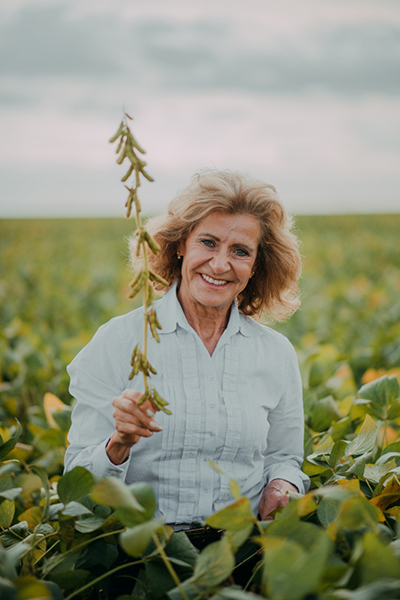
productivity and biodiversity conservation in the Cerrado, the main biome present in the Matopiba region.
In the 1980’s, Amélio, Carminha’s father, sold their farm in the state of Rio Grande do Sul and moved to Bahia where land was cheaper and he was able to buy a larger farm. However, farming in this region was not easy. At times the family traveled up to 30 km to find a reliable water source.
During those early struggles, the family soon became aware of the need for good farming practices to ensure the long-term success of the family business. That knowledge, combined with hard work, has paid off. Now, Carminha and her siblings produce 2 percent of all of the soy seeds in Brazil.
Currently sixty-six, Carminha has led a local non-profit (APAE-LEM) as well as the Union of Rural Producers from the city of Luis Eduardo Magalhães for four years. She is now the first woman to act as the vice president of the Agriculture and Livestock Federation in the state of Bahia in Brazil.
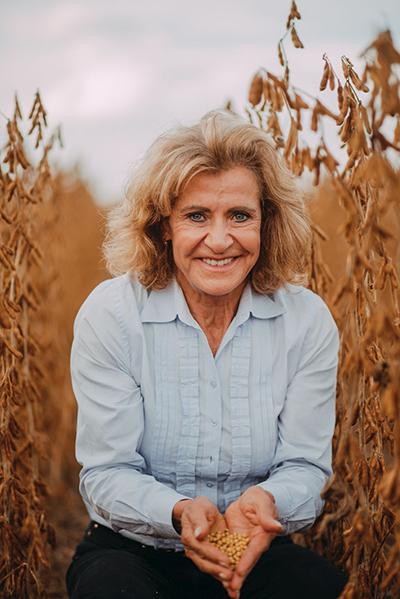
A Participative Process
The methodology to calculate carbon balance in farms was developed by a working team of 68 members, including local partners and specialists. The participation of farmers in the process was essential to collect the needed information from farms. Overall, 300 producers and technicians were visited or contacted, and 58 farm properties tried the calculator in Western Bahia.
“I firmly believe that no one can achieve anything by themselves. We are strong only as part of associations, organizations, and with representation. Farmers, regardless of their size, need to stay together”, says Carminha, referring to the fact that the farmers’ union is fundamental for the continued progress towards sustainable soy production.
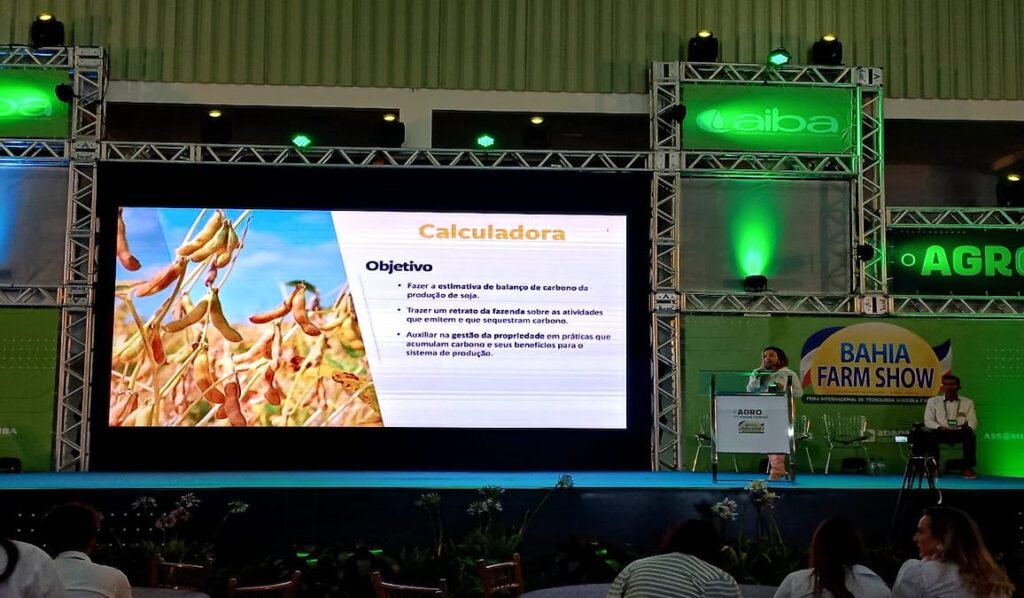
According to Eneas Porto, AIBA’ s Sustainability Manager, the carbon calculator will enhance rural sustainability in the region by instigating changes in the field and involving the local population.
“Direct participation from farmers demonstrates the interest in rural communities. We believe that a sustainable point of view is growing and its results are reflected in better soil quality, better productivity and better water infiltration in the soil,” said Eneas.
While the project to improve the carbon balance in Bahia has received funding from the Norwegian Development Cooperation (Norad) through its International Climate and Forest Initiative (NICFI), it has also received support from the Land Innovation Fund.
For the Director of the Land Innovation Fund, Carlos E. Quintela, Solidaridad’s project has fostered innovation in agricultural sustainability. He says, “It [the carbon tool] expanded the understanding of the benefits of sustainable and low emission practices for the farm and the environment. The data collected in Western Bahia contains important information for the development of public policies that can promote low emission farming for the mitigation of climate change.”
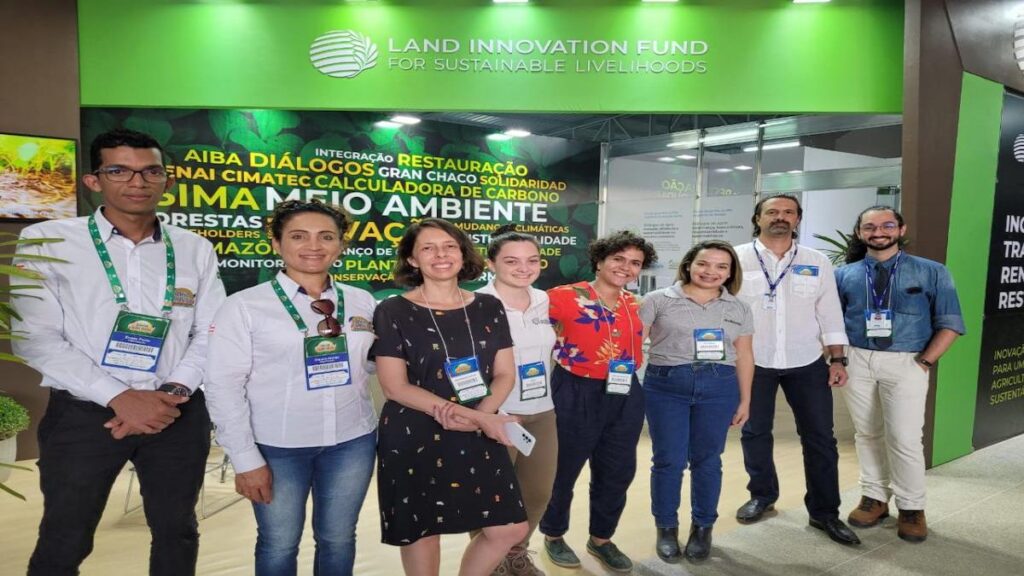
Further Expansion in Matopiba
Solidaridad aims to expand use of the carbon calculator across more farms in the Matopiba region. Based on the experience gathered in Bahia, a new project was launched in the neighboring state of Maranhão: Low Carbon landscapes in Maranhão. This initiative is funded by the German Agency for International Cooperation (GIZ) and is part of the larger Global Agri Chains Programme that the Maranhão Government is implementing with support from Brazil’s Federal Ministry for Economic Cooperation and Development (BMZ).
The goal is to use the carbon calculator on 15 farms within the region. A demonstration farm has already been established to show the technical and economic viability of low emission practices, and to stimulate the calculator’s adoption among local farmers.
With the help of Carminha Missio, Solidaridad looks forward to new projects and new initiatives to support farmers in Brazil. Carminha’s invaluable assistance in the development of the carbon calculator has laid the groundwork for farmers to take effective action to improve soil health while they make real efforts to conserve the natural environment.

